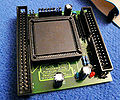The CPC-IDE was the first fully working IDE interface for the CPC. Later on it got expanded to the SYMBiFACE II.
History
In Autumn 2004 the CPC-IDE was developed by Dr.Zed with support from Octoate (financial), Tolkin (financial), TFM (finding a free port address, bringing Dr. Zed to CPC at first and indirect financial support in for of f.e. an C-programmable calculator etc.) and Prodatron (software support in SymbOS). It was the first released hardware solution ever that allowed connection of IDE harddrives and CF cards to the CPC. Technically the CPC-IDE interface was an independant development, though the idea of splitting 16bit words into two 8bit bytes for the data transfer came from the GIDE IDE interface by Tilmann Reh.
It was fully working, but still in a prototype state, so only 10 pieces have been produced.
During the production of the CPC-IDE Prodatron joined the team and created IDE-support in SymbOS for FAT16 and FAT32 hard discs by Xmas 2004.
After getting it working successfully, Dr.Zed and Prodatron made plans for a second version, which includes a lot of more extensions. So the SYMBiFACE II wasn't merely an IDE interface, but it merged the CPC with actual PC technology at that time (2006).
Technical
The CPC-IDE interface uses port &FD06-&FD0F by default, but you can select the upper 8 bits with the jumpers on the board. The I/O Ports are compatible with the SYMBiFACE II:IDE registers.
Pictures
Clones
Beside the SYMBiFACE II hardware, which is an advanced successor with additional features, two clones of the CPC-IDE have been created:
- FreeIDE: This is a 1:1 copy of the CPC-IDE by Pentagon in 2005, which was using the original CPLD code from Dr.Zed. There were only a few prototypes existing.
- X-Mass: This new implementation by TotO from 2014 is based on a DOM (disc on module), which is working in 8bit IDE mode. It's not a fully compatible IDE interface, as it doesn't contain a real IDE connector and doesn't have support for IDE storages with the usual 16bit mode. It's designed for the very compact MotherX4 expansion. During 2016 SyX released AcmeDOS, which was the first full working Amsdos FAT16 implementation for the CPC.

